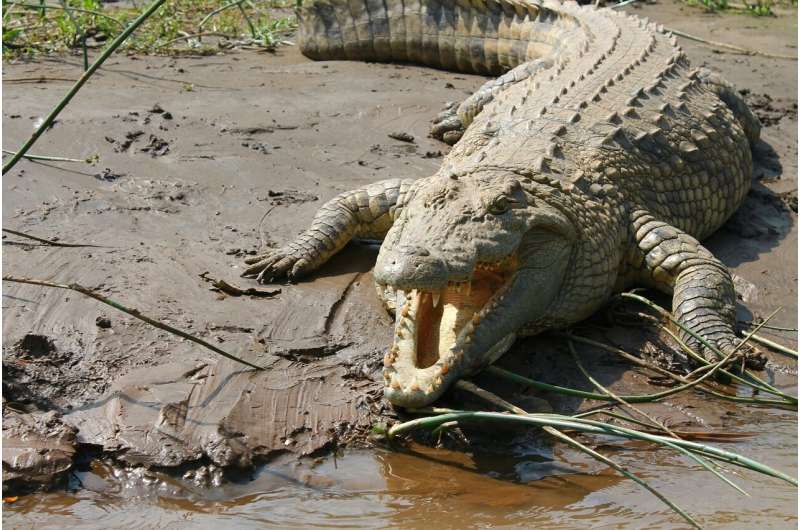August 9, 2023 report
This article has been reviewed according to Science X's editorial process and policies. Editors have highlighted the following attributes while ensuring the content's credibility:
fact-checked
peer-reviewed publication
trusted source
proofread
Nile crocodiles found to respond to baby cries from assortment of mammals, including humans

A team of bioacoustics researchers at the University of Saint-Etienne in France, working with a colleague from University Lyon, has found that Nile crocodiles respond to an assortment of baby mammal cries, including humans. In their study, reported in the journal Proceedings of the Royal Society B: Biological Sciences, the group tested crocodile reactions to recordings of babies crying at CrocoParc in Agadir, Morocco.
Prior research has shown that crocodiles tend to respond to the sound of distress in prey—they perk up and often head toward the sound hoping for a quick and easy meal. In this new effort, the research team wondered if crocodiles would respond in similar ways to other creatures that are not necessarily prey.
To find out, they compiled a collection of recordings of babies of multiple species crying or yelling out in distress. The recordings featured such sounds from chimpanzee, bonobo and human infants in various degrees of stress. Human recordings included crying infants at home and at a pediatric office as they received vaccinations.
The researchers then ventured to CrocoParc in Morocco, an outdoor facility created to house more than 300 crocodiles. In the park, the crocs are allowed to roam free over the grounds and to behave almost as if they were living in the wild. There the team set up speakers and played the recordings while recording the reactions of the crocodiles.
The team found that most of the crocs responded to the recordings. They also noted that responses tended to be more urgent when hearing highly stressed cries. They also found that most reacted right away, especially when the cries suggested an infant of some kind might be in serious trouble.
Notably, one croc, presumably a female, after heading to the speaker from which infant cries were emanating, suddenly turned around and faced others who had responded. Such a response, the researchers suggest, was similar to the way a mother would respond when protecting her young.
The research team concludes that there is a universality to baby cries, along with a long history of crocodiles consuming infants that wander too far from parental protection.
More information: Julie Thévenet et al, Crocodile perception of distress in hominid baby cries, Proceedings of the Royal Society B: Biological Sciences (2023). DOI: 10.1098/rspb.2023.0201
Journal information: Proceedings of the Royal Society B
© 2023 Science X Network



















